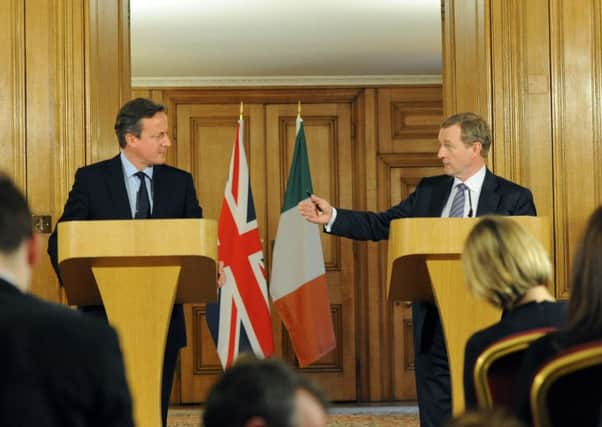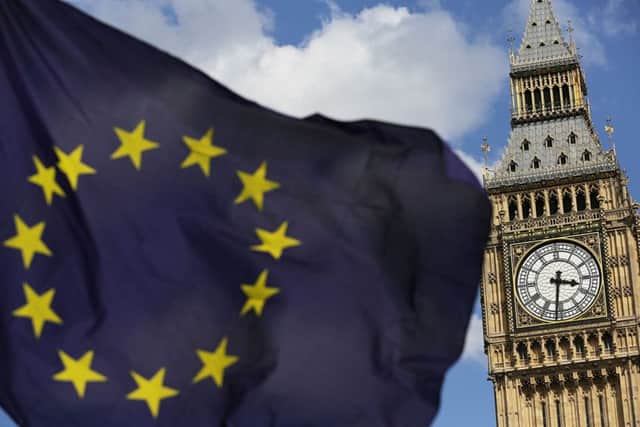Dublin needs to keep its options open, including quitting the EU


That decision will shape its future – to decide whether to continue to be part of “Team EU”; or alternatively once the UK leaves, that its future lies more with the North Atlantic Anglophone world.
Ireland joined the EU, along with the UK, in 1973. Given the circumstances of the time, the country had no real option. Today, circumstances have changed and these questions and answers are not so clear cut.
Advertisement
Hide AdAdvertisement
Hide AdIreland is a much-changed country, being those with the highest per capita incomes in the EU and with a much more diversified set of relationships, both economic and political, than in 1973.


However, the older connections still have huge resonance. Ireland’s SME sector is still much more connected to the British market than its modern FDI related industries. When the recession struck in 2008, Irish people moved mainly to Britain, Canada and Australia, not mainland Europe.
Therefore, the decision of the Irish government to peremptorily stick with Team EU, regardless of the outcome of the Brexit negotiations, is perplexing to say the least. I have never heard of a country going into negotiations without a bottom line before.
There were no recriminations in Dublin against their wholly misguided policy of siding with the EU during the Cameron re-negotiations. Brexit will have a hugely negative effect on Ireland but the government in Dublin did not lift a finger to give Cameron a decent hand in the referendum.
Advertisement
Hide AdAdvertisement
Hide AdThere was deep scepticism among Irish government officials about the possibility of the referendum being carried. It was a game of chicken and when the bluff was called, officials started scrambling for a coherent response.


The Irish Department of Finance has outlined a dire scenario in the event of a hard Brexit. It estimated that in such circumstances, exports to Britain could decline by 30%; and a fall of 40,000 people in work. Whatever about the accuracy of any economic forecast, it is abundantly clear that a hard Brexit would have very serious consequences for the Republic.
Curiously enough, that department has not produced figures about the outcome economically of deciding to leave the EU and keeping a free trade area with post Brexit Britain.
While the details of a UK (and possible Ireland) trade deal with the EU have not been outlined, it would be possible to use WTO type access to the EU markets as the base line for an estimate.
Advertisement
Hide AdAdvertisement
Hide AdThe Irish government must also take into consideration that the Belfast or Good Friday Agreement (GFA) was agreed under the umbrella of both Britain and Ireland being members of the European Union.


Therefore, there must be serious doubts about the sustainability of the GFA and St Andrews Agreement, if the basis on which they were constructed is altered by a hard Brexit.
The EU is changing and there are moves afoot to attack the foundation on which Ireland built its recent success, namely its advantage in tax terms in securing a huge proportion of American FDI. The move in the EU towards a more harmonised tax arrangement and a vigorous campaign at OECD and G20 levels against aggressive corporate tax avoidance means that Ireland’s current arrangement will be constantly under attack. Without the UK as a strong and reliable ally inside the EU, the Irish ability to resist will be compromised
The Irish government, its politicians and officials, are working hard to plan for a hard Brexit. This is very laudable but in some ways, it represents another example of Groupthink.
Advertisement
Hide AdAdvertisement
Hide AdThe whole political establishment seems to have taken the same line. The alternative, a decision to hold off any decision until the outcome of a deal emerges, does not seem to have been given any serious thought. The very idea that Ireland might leave the EU, if the deal is bad enough, is literally beyond the Pale for the Dublin establishment.


The EU itself will not want Ireland thinking about Irexit. As with the UK, albeit on a smaller scale, Ireland is a net contributor to the EU budget, paying in more to the EU than it receives in the various EU programmes.
The country has become a poster boy for economic recovery in the EU, even though the Republic’s good economic performance was despite the EU rather than because of it.
I still hope that a relatively soft Brexit can be negotiated which would allow for a single labour market in these islands, the maintenance of the Common Travel area; and full and free trade between the UK and the remaining members of the EU. However, this is unlikely and it is the height of folly not to consider all options, including Irexit.
Ireland needs to keep all its options open.
• Ray Bassett is former Irish Ambassador to Canada, Jamaica and Bahamas